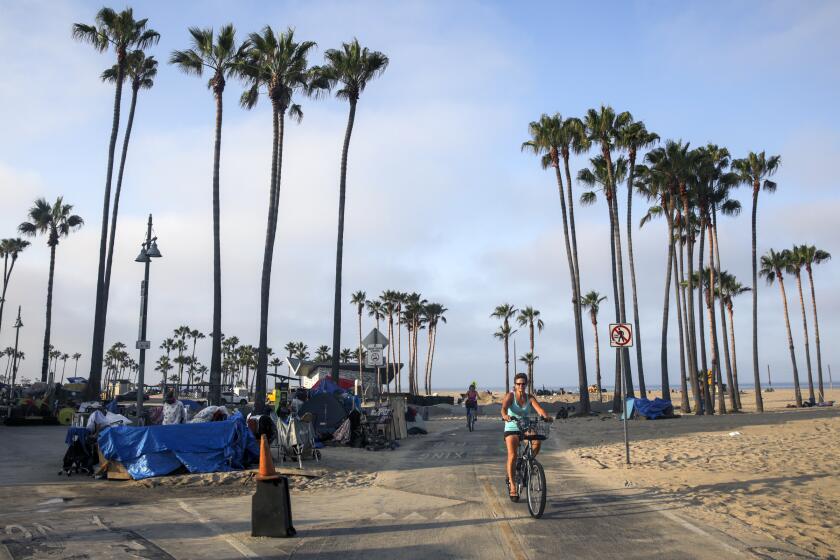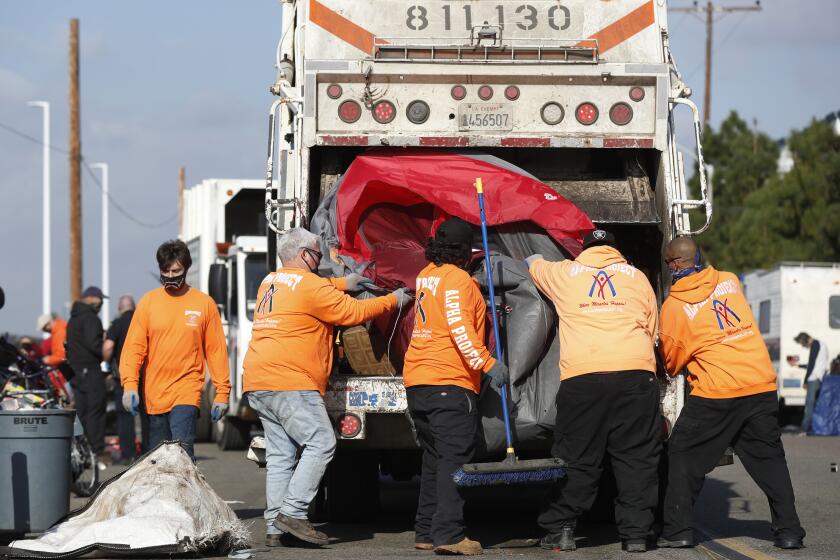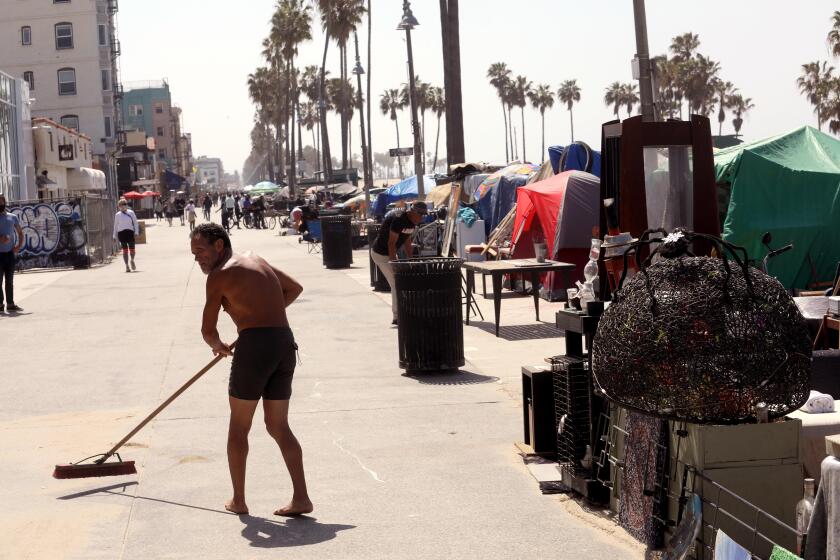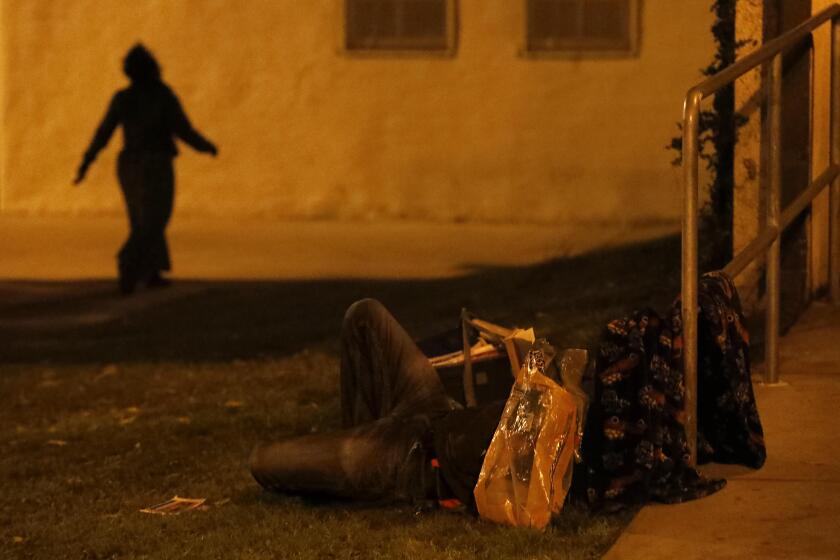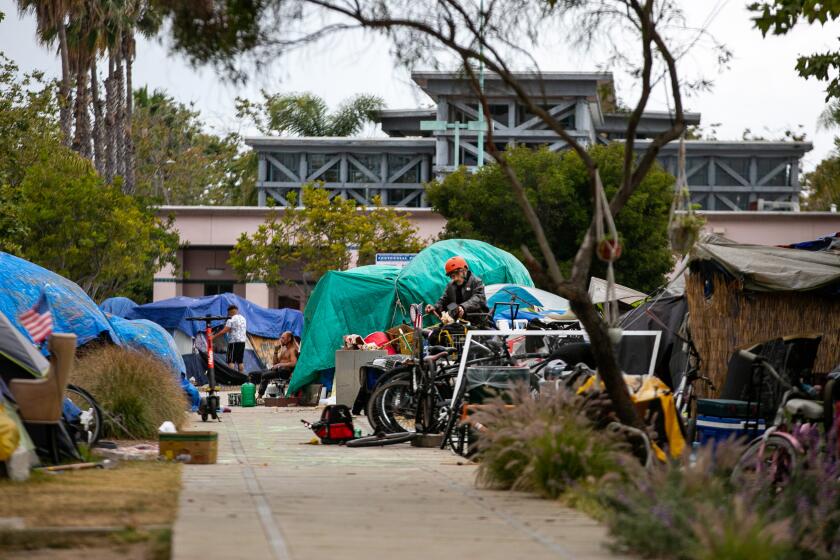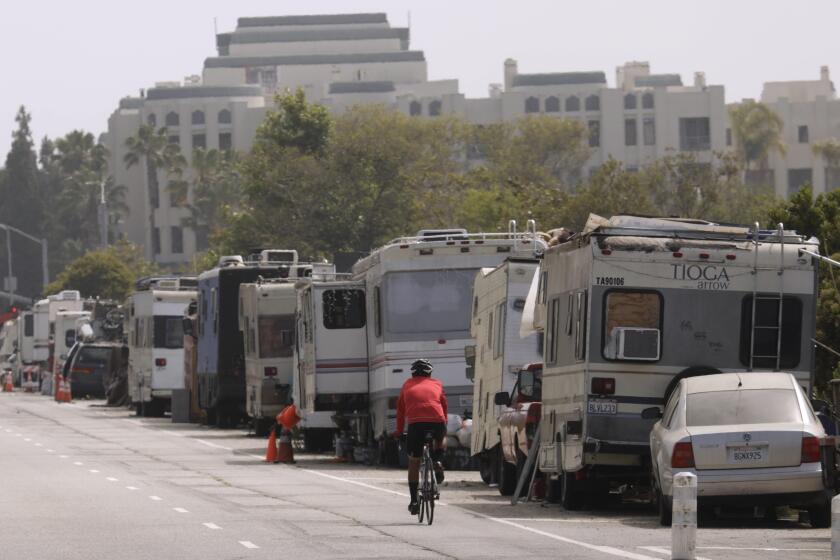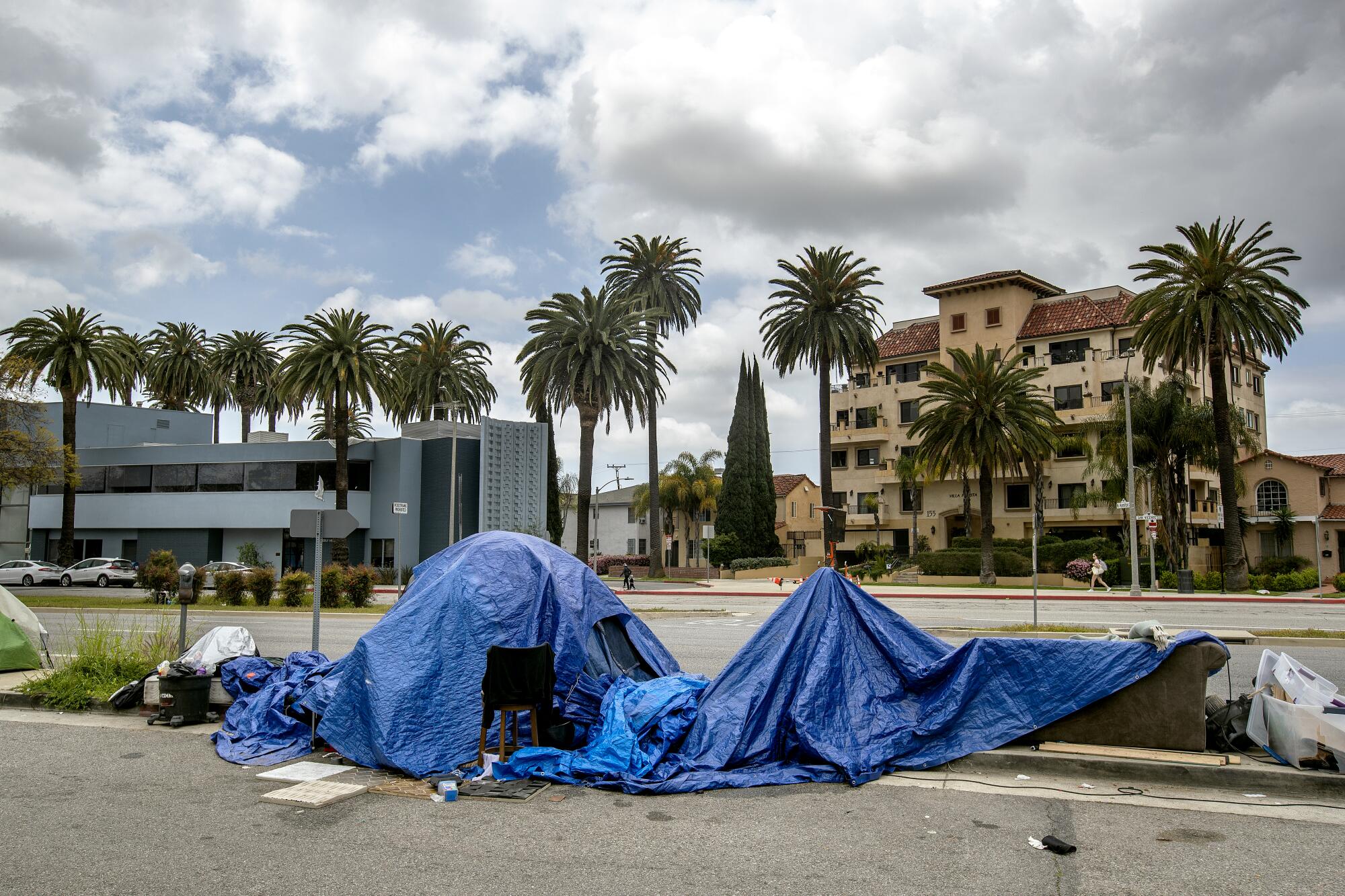
- Share via
We must deal with the societal problems of mental illness and drug addiction, but they’re not the cause of the homelessness crisis in Los Angeles.
Estimates released last month indicate that the number of unhoused people in L.A. County rose 9% from last year, to 75,518. How did they come to be homeless? “High housing costs and low income,” according to a June report from UC San Francisco researchers. They surveyed nearly 3,200 unhoused adults in California, 70% of whom said a rental subsidy of $300 to $500 a month would have kept them off the streets.
In other words, the gulf between incomes and California housing costs has simply grown too wide. No amount of mental health care or addiction services will change that, but affordable developments and housing subsidies would.
I spoke with three of my unhoused neighbors on the Westside — Jermaine, Jason and John — in June and July, and the conversations show just how quickly one can be forced out on the street. They agreed to share their stories with The Times on the condition that their last names not be used. — Robert Karron
Jermaine
My name is Jermaine, but everyone calls me “J.” I’m 47, and I grew up in South Central. I lived with my dad — he’s a carpenter — and an older brother; my mom left us when I was a baby. I actually met her again when I was 14.
I went to Locke High, and I got good grades, but I also got in trouble, so I finished at Dorsey. My favorite teachers taught English: Mr. Booker drilled us on grammar; Miss Carter encouraged us; and Miss Plant insisted on participation. I’ve always liked to read. My dad bought me comic books, National Geographics and the Encyclopedia Britannica. One day, reading “The Incredible Hulk,” I saw the word “automaton” and asked Dad what it meant. He said: “You’ve got those encyclopedias. You figure it out.” That inspired me. I read them all.
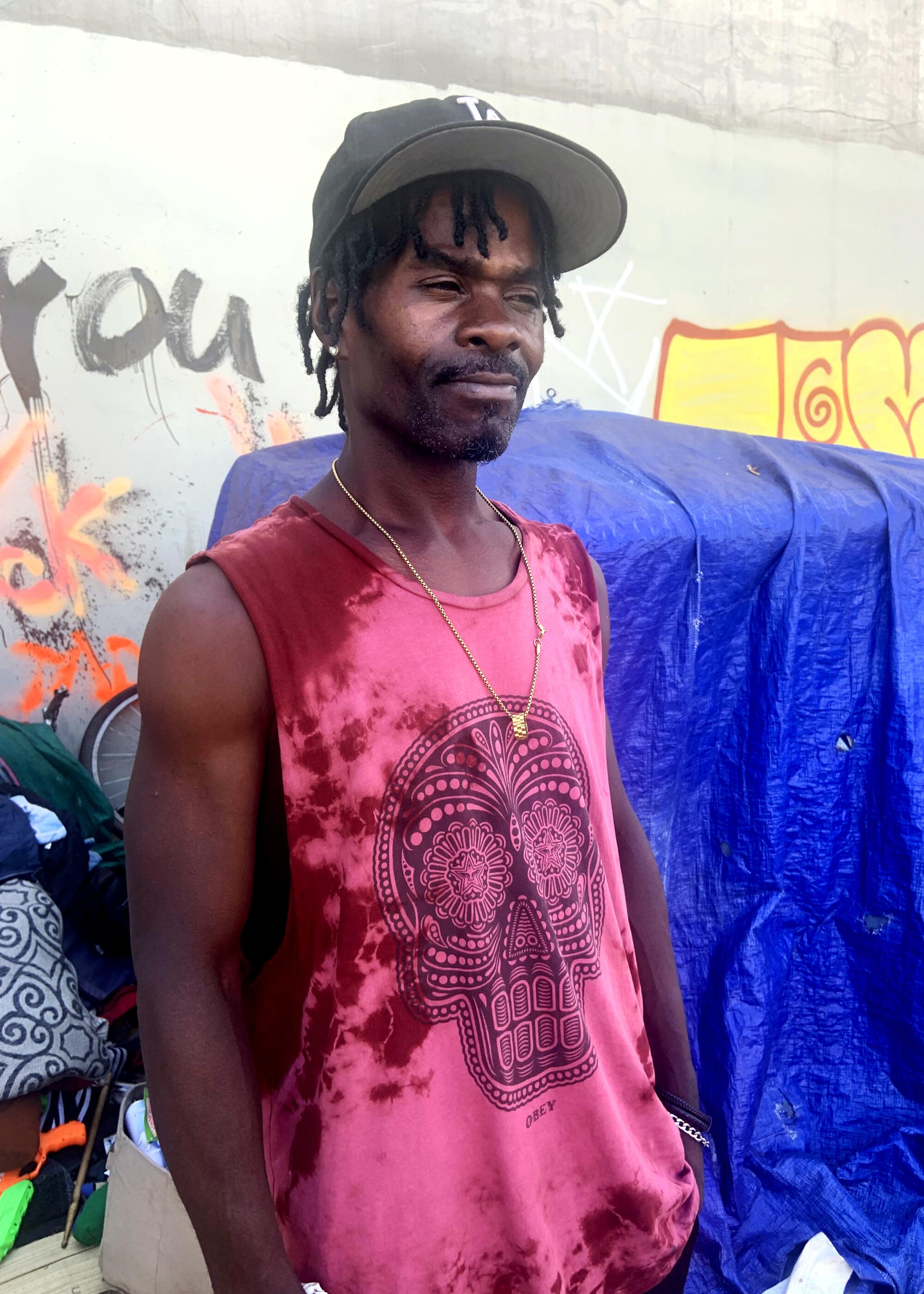
I was in a gang, but it’s not what people think — tumultuous or chaotic. At Green Meadows Park, on Avalon, in the summer, everyone’s there. If an older boy sees something in you, they make you their “Little.” After that, they’ll “take you home,” to “the set.” There’s some fighting, sure, but it’s mainly just kids in the neighborhood hanging out. There’s solid camaraderie there.
Next to Dorsey High is Jackie Robinson Field, then the Navy recruiting office. One day Miss Plant asked a recruiter to talk to us during class. He told us about traveling. It sounded exciting. After that, I took a placement test. I could have gone to college, but I wanted something different. I was in the Navy three years, mostly in Japan. I worked on the A-6 Intruder bomber jet, and I learned a lot — about hydraulic fluids, ejector seats, jet intakes. But then they decommissioned that plane. What I’d learned was no longer applicable. Also, I’d done planes. I wanted something different.
Andromeda, Erica and Heidi have gotten by for years on the street. Sometimes government helps them, but at other times it makes their lives harder.
After an honorable discharge, I entered vocational rehab, through the Vet Association, and became a certified nursing assistant. I trained for that degree with my wife, Karen — may she rest in peace. I worked for home health agencies for a while, but I found I didn’t like blood or syringes. What I wanted to do, I realized, was graphic design. I went back to school, still on the GI Bill, and got my certification and then some gigs. Meanwhile, Karen became a licensed vocational nurse, and she was working on becoming a nurse practitioner when her lupus started up again. She’d been diagnosed at 14, but nothing happened until she’d had our second child. She was in the hospital nine months. I got help from my aunties, but I was essentially on my own. She died three years later, in 2015.
You could say I became her nurse for the last year. I was doing some freelance graphic design work, but not much.
We ran out of money.
A lack of affordable housing is a key factor, according to a study of the nation’s major areas.
U.S. Vets found a three-bedroom apartment for my kids and me. They kept moving us, every 90 days. And then once in 2018 when I tried to find a place, they said I wasn’t eligible. They wanted documents like birth certificates and Social Security cards, which we’d had in storage but were lost when we couldn’t pay the rent. At that point, I sent the kids to Karen’s sisters, and I moved to the streets. I didn’t ask her sisters to house me because I didn’t want to be a burden.
One day, reading “The Incredible Hulk,” I saw the word “automaton” and asked Dad what it meant. He said: “You’ve got those encyclopedias. You figure it out.” That inspired me. I read them all.
— Jermaine
Since then, I’ve been looking for housing. Maybe I could have gotten it just for me, but when they hear it’s two kids too, they say they don’t have anything. I’ve applied for vouchers. To be honest, I think my caseworkers dropped the ball. I haven’t seen them in a year. I went to the office recently, and they said I had to reapply with the documents I still don’t have. I was on the phone with them just yesterday. They wanted my daughter’s lost birth certificate and my lost Social Security card. I was crying. You’d think a caseworker could help, but I’m doing it all myself, on the street, from my tent.
Jason
My name is Jason, and I grew up in Orange County, near Buena Park. I have a little brother, and my mother was a single mother; she supported us. My father wasn’t around much. He’s been a transient on and off for the last 20 years.
High school was hard. I wanted to be accepted, and I ended up hanging out with the cool kids, and doing what they did, which was ditching school. At some point, they put me on probation; eventually they kicked me out. Later, I got my GED. I like learning, but not what the schools were teaching me. My goal is to go to the Los Angeles Recording School, in Hollywood, or maybe to film school. I like music and art because they provide an escape. I’m in my head most of the time. It’s like I can’t get started.
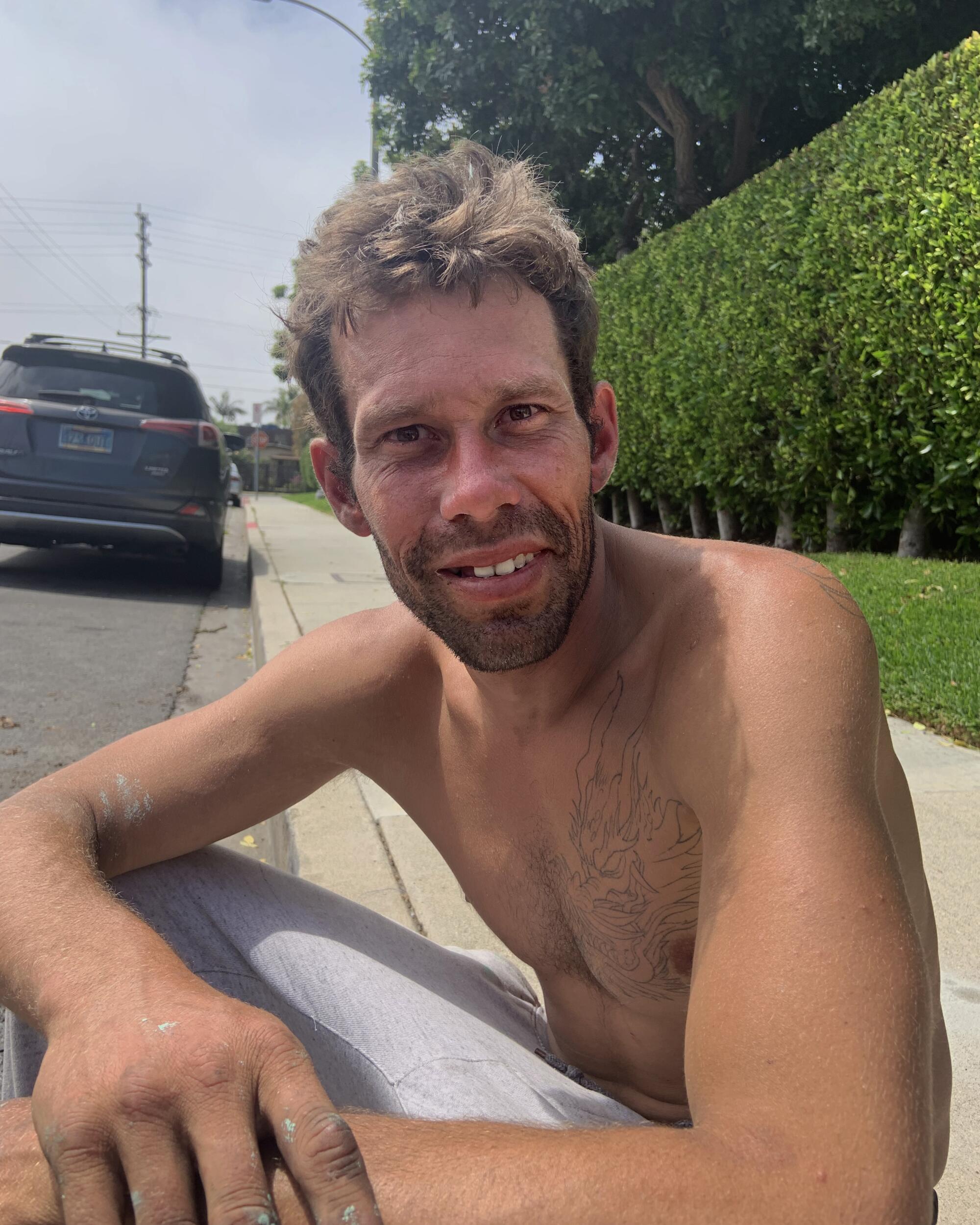
After I got the GED, I met a girl. We were together eight years. I worked for her family farm in Humboldt County. You’re outside, in nature, with animals. Those were the best times of my life. When you’re in the mountains, you see nothing but trees. On top, it’s so serene. Up there, I’d think of becoming a park ranger, something like that.
When we broke up, I had to move back in with my mom. It was a shock — partly because I was back home again and partly because I’d just got custody of my daughter from a previous relationship. She was born when I was in high school. I got scared, and I ran away. I wasn’t ready for that. I started partying — so her mother took custody. But eventually her mother wasn’t able to provide, so she moved in with us. Now it was my turn. I had no idea what to do. I was back on my mom’s couch. I ended up giving custody to a close family member.
Three men, in their 50s, 60s and 70s, represent a growing population among L.A. County’s unhoused.
I had to start over. I got a job in the home remodeling industry. I was in sales, a broker. I’d generate revenue. Without me, there’s no job. I have the gift of gab, I clean up well, and I’m good with people. I worked there 10 years. But it turned out to be a dead-end road. The company took my commissions — using leads and selling them to other people. I’d been wasting my time, spinning in circles. I had to quit.
I’ve been on the streets for six months now. It’s not as much of a shock as you’d think, because I grew up seeing my dad do it.
— Jason
That was last year. I’ve been on the streets for six months now. It’s not as much of a shock as you’d think, because I grew up seeing my dad do it. You could say I was seasoned. Also, before I came here, I’d cut out all the negative people in my life. I was used to being alone; I’m the Lone Ranger now. I entertain myself.
The crazy thing is that this should all be so easy. All I need is a roof over my head and some money. That’s it. I’d be good to go if I had that. But I have no credit. Could I go back to my mom’s and use that as a launching pad? I don’t want to put her through that. I’d rather figure this out on my own.
Three unhoused women who live in Venice say they have learned to protect themselves, in body and spirit.
I want to get it together in the next few months; I don’t want to waste any more time. I’m getting older, you know — I’m 35. I’m halfway through my life.
John
My name is John, and I’m 66 years old. I’m from Pensacola, Fla. I went to Florida State on a track scholarship. I was a high jumper, and my high school record was 7 feet, 4.75 inches. I missed the Montreal Olympics by one spot! I studied business management, then got my MBA and law degrees in Gainesville. I’ve also taken workshops with business professionals like Donald Trump to learn how to be successful. You’ve got to surround yourself with successful people. You don’t want to be around losers.
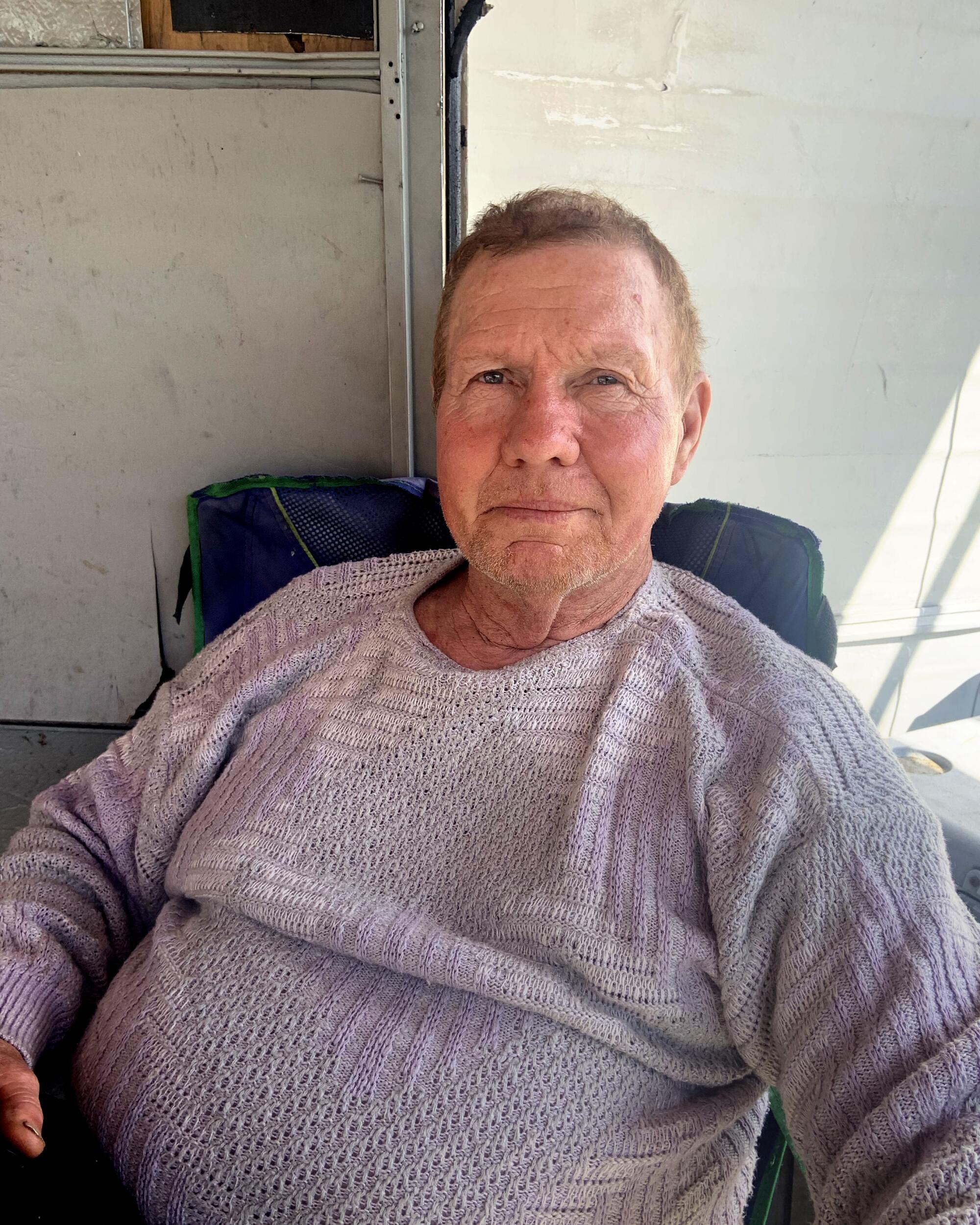
For a while, things were great. I owned a trucking company. I had a landscaping company, and I owned a Hooters and a vending company. I got a license in commercial diving, and I owned a 38-foot sailboat. I’ve never been afraid to step out and just do stuff. I was at Woodstock when I was 13 because I wanted to see Jimi Hendrix. But in 1986 I got divorced, and that ruined me. I had to sell all my businesses and give my wife $2 million. That was good money back then.
Three men who have been staying in the tent city outside the Venice library branch talk about how they came to be there and how they see their futures.
I took my sailboat to the Caribbean. I was planning on sailing around the world. I still had money. I spent six years living on that boat. I took people on dives and helped them with their boats. Then my adopted father died, and my adopted mother was alone. I went back. I sold my boat and got an 18-wheeler so I could support myself. When I got there, the vegetable garden, which was always well tended, was just trees! That’s how bad it was. That lasted until 2004, when my mom got brain cancer. She died, and I moved to a motor home. I continued driving my rig and working in the commercial diving business until 2009, when the economy tanked. I thought about where to move and decided on California. I’d spent a lot of time here. If you drive rigs, you have to, because this is where the produce is. I didn’t want to drive a rig anymore, so I sold it. I figured I could support myself on my other skills — business management, accounting, law or commercial diving (I also know a little about plumbing, electrical, roofing and auto mechanics).
Doesn’t matter what you can do — no one, and I mean no one, will hire a homeless person.
— John
I got off the bus the day after Christmas, 2010, and for the first six weeks I slept in the courtyard of the Midnight Mission. I had money, but I didn’t want to spend it foolishly by choosing a wrong place. I wanted to get a good deal, and local knowledge is important. I ended up renting a place on Vermont and Exposition, but it didn’t work. I got harassed, people broke into my apartment, and sometimes they threatened me with knives. After a year, I packed a bag and drove off in my van, which had all of my diving equipment, and I used that to support myself for the next few years. But one day it was stolen — thousands of dollars’ worth of equipment. I was back to nothing.
Steve and Jeffrey talk about their late wives and how they hope to get back on their feet.
Some people who lose everything jump out of a building. I’m stronger than that. I can live in a 10,000-square-foot house or in a tent, and I’m the same person — but it did take its toll.
I was in a tent until a year ago, when I got this RV. No one will give me a job, because no one hires you if you’re homeless. Doesn’t matter what you can do — no one, and I mean no one, will hire a homeless person.
Robert Karron teaches English at Santa Monica College.
More to Read
A cure for the common opinion
Get thought-provoking perspectives with our weekly newsletter.
You may occasionally receive promotional content from the Los Angeles Times.
